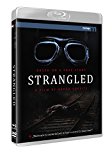Eye For Film >> Movies >> Strangled (2016) Film Review
Strangled
Reviewed by: Jennie Kermode

Between 1957 and 1967, six young women were murdered in the small Hungarian town of Martfü. The public became frantic, but efforts to stop the killings were hampered by an official line that there were no serial killers in this Communist paradise, and by the fact that the earliest murder was, for a long time, thought to be unconnected to the others - because a man had already been imprisoned for it.
Staying fairly close to the known facts, Strangled dramatises these murders, the investigation, and the political pressures connected with it. There's a clue in the title: the women were killed in a variety of ways, but the strangulation refers as much to the effect on the investigation of political interference, and to the impact of the political system on day-to-day life. This is a film full of different kinds of repression, some of them welcome (there's a suggestion that one of the detectives is himself sexually aroused by the corpses brought in to the morgue), some of them decidedly less so.

We open with a low key scene outside a shoe factory (the town's main employer) where staff have just completed their working day. A man, Réti (Gábor Jászberényi) arrives to meet a woman with whom he seems to be in a romantic relationship. But as they walk along a quiet country road, she tells him that whatever was between them is over; that she doesn't love him. The next day, she is found dead. Réti is quickly convicted and jailed.
Did he kill her? Something about him keeps us guessing. He's racked with feelings of guilt which may or may not relate to something else. But seven years after he's jailed, a fresh wave of attacks begins and serious questions start to be asked. Earnest young detective Szirmai (Peter Barnai) travels to the area to try and piece things together. Local investigator Bóta (Zsolt Anger) is tormented by conflicting desires to see the murders end and to cover up his part in the hasty, perhaps unethical conviction of Réti. It doesn't help that he's attracted to Réti's devoted sister, Rita (Zsófia Szamosi). In the one passionate scene that Bóta and Rita share, director Árpád Sopsits draws deliberate parallels with the sexual proclivities of the killer.
There are few female characters in this film, which pretty faithfully reflects the power structures in Hungary at the time, but Sopsits is careful to show them as human beings and the actresses chosen to play the victims give them enough depth to allow for a sense of loss. Even though the sexual aspect of the murders is important to Sopsits' depictions (and to what he's trying to say), it's always clear that this represents a distorted perspective on the world. We see the killer at home, observe him moving through life like an ordinary man, but something is always subtly off key. Sopsits presents his truck like an expression of his monstrousness, looming out of the dark. Each time he climbs into the cab, we are prepared for something horrible.
As the detectives struggle to piece together clues and plough through layer upon layer of bureaucracy - as Réti, made spiteful by his suffering, refuses to cooperate - something perhaps too awful for them to comprehend is creeping through the night. Factory workers walk home in pairs or small groups. Individual freedom is lost to fear. With the spectre of war still haunting Europe, the political dimension of this is never far from the surface.
An intelligent and deeply unsettling reflection on troubled times, Strangled is a remarkable accomplishment that puts most other serial killer films of the past decade firmly in their place. Catch it if you can.
Reviewed on: 12 Nov 2017

















